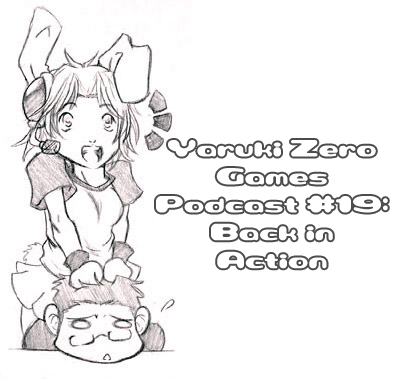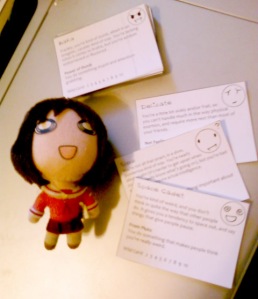I’m apparently making a yearly review post a regular thing now. Also, I’ve been hugely inspired to blog over the past couple weeks, but then there have genuinely been a lot of exciting things going on.
Actual Gaming
This past year I did a lot of gaming with my Friday group, which has been going through a series of short campaigns for some time. Our longest game was also our best. We started off playing Smallville and then switched over to Primetime Adventures, which wound up working out incredibly well. The game was kind of a Smallville-ish thing, a present-day setting where people with superpowers were emerging (to the chagrin of the Greek gods), without any real DC-inspired elements per se. That was what inspired me to write Entanglements, which got its first test run as part of the setup for our “Ameripunk” Wushu game (my character was a bibliomancer trained by Mark Twain and entrusted with the Amerinomicon). I do still need to make some refinements to Entanglements, but it seems to work pretty well.
For a variety of reasons what had been my “main” group heavily dropped off gaming. We did get in some D&D and had a ton of fun with Gamma World, but we nonetheless went from gaming most weekends to someone maybe getting a bit of something together every other month. I think it has a lot to do with human factors more than anything. With working 40 hours a week, attending another game group, and hanging out with friends most Mondays, I’ve tended to spend the better part of most weekends writing and recuperating from the prior week. It also doesn’t help that our game of choice is D&D4e, which while definitely easier on the DM than 3rd Edition nonetheless takes a fair amount of work to run. I tried to run a Dark Sun game, but I kept ending up having plans slapped together an hour or two before the game started. I’m hoping to rope that group into playing Dragon World, because it’s a fun game I can bullshit my way through running, and because if our D&D games are any indication we can definitely get into the right spirit. We’re also getting back a member who’s been absent for a few years, and I’m hoping that will help reinvigorate our gaming.
Conventions and Whatnot
This year also saw the first time I ran a convention booth by myself, first at a tiny anime convention called Kin-Yoobi Con, and then at the Alternative Press Expo. Both were interesting learning experiences, though by the end of APE I was ready to swear of cons for a while. Anime fans are definitely more receptive to RPGs than indie comics fans though. Neko Machi had kind of a rough second year too, and we’re hoping to reinvent it somewhat (with a format change and such) and relaunch in early 2012.

Game Projects
I only did two Kyawaii RPG things this year, and one of them I started and finished yesterday. I still have like half a dozen unfinished ones that I’d like to work on and haven’t touched.
The anime series Madoka Magica was a massive thing in 2011. For me personally it was the dark deconstruction of the magical girl genre I’d been wanting for years, and it inspired me to design an RPG that I titled “Magical Burst.” I have far too many works in progress, but this is easily the most promising and most popular. I put the rough drafts of the game online just for people to read, and it totally took off, becoming a standard of the 4chan /tg/ crowd. I keep coming across threads where people suggest it, and in one case I came across an unfinished Black Rock Shooter game where the creators had thrown up their hands and said, “Just use Magical Burst.” I don’t know how much is my accomplishment as a designer (there are parts of it that make me wince) and how much is other factors, but it’s helping motivate me to actually get the game done for a change.
Dragon World is the other new game I started on, and it proved very fun to both work on and to play (when we did a 3-session playtest). The idea came from when I finally got around to reading the Dragon Half manga, and this “90s comedy fantasy anime” game also draws inspiration from Slayers and a host of other titles. It’s based on the Apocalypse World rules, though of course with plenty of changes for the game’s very different genre. I’m planning to put a “Dragon World Hack” PDF up for free once I get some more things done.
Golden Sky Stories is of course the Japanese RPG I translated and that we’re gearing up to do a Kickstarter to publish. I’ve posted a good amount about it already, but I’m really excited to finally get it out into the world. I’m also working on putting together an original replay that’ll be a free preview of the game in English. I have the rough manuscript and artwork all ready in fact, so I’m just waiting for a friend to tackle the editing and layout. For the game itself, Clay is still working on the layout, and for the Kickstarter I basically just need to wait for my friend to finish up tweaking the video and fill out stuff on the Kickstarter backend for the launch.

Gamer Culture and New Stuff
I’ve made a habit of lurking in the grognards.txt thread on Something Awful. It’s a collection of the most terrible things said by grognards, and is up to about 1500 pages now. It’s kind of therapeutic at times, and it’s helped me get a better perspective on how D&D has changed over time. Probably the biggest lesson from grognards.txt however is simply: people are at their best when they’re actually doing stuff they like instead of bitching about things they don’t like. There are OSR blogs that come off as obnoxious and curmudgeony (at best) when talking about RPGs published less than 20 years ago, and yet when they’re earnestly expressing their passion for old-school swords and sorcery I want to cheer[1]. I’m also contemplating doing a “grognards.mp3” podcast episode with dramatic readings, though with everything going on it’s been really damn hard to find time for podcasting. I have a whole solo episode recorded that I haven’t had time to edit.
For a while now I’ve been interested in trying to expand the medium of RPGs in new directions, particularly in terms of components and presentation. I’ve talked before about looking into using board game components (and I still want an RPG that makes good use of a spinner!), and I love how (for example) Jake Richmond is making good use of comics to teach people how to play his newer games. In December I hit on the idea of making an RPG in the form of a smartphone app and designing it around that medium as much as possible, an idea that won the “Brain Full of Games” contest, which consequently has me starting on a design document for Raspberry Heaven (my Azumanga Daioh inspired slice of life schoolgirl game) as an “RPG app.” I’m already talking to some programmers, so things stand to get really exciting on that front in 2012.
I’ve come to be a bit irritated at gamers, at least as represented on online forums, for how they can come across as having desperately narrow tastes in RPGs. For my part there are things that don’t interest me (board games, horror, zombies… I could go on), but there’s almost nothing in the way of RPGs I wouldn’t be willing to play if a friend really wanted to run it. And yet, if you propose any slight deviation from the books and (standard) dice formula you’ll get a chorus of naysayers. But on the other hand I’ve realized that there are a lot of potential design elements that are uncommon in RPGs in part because they’re difficult to use well. I think part of why resource-based diceless games are rare (for example) is that they only really work when you depart at least somewhat from the traditional paradigm of rolling for success and failure. An RPG that’s totally ordinary except for having players spend points instead of rolling dice for action checks is creating a bunch of perverse incentives and substantially changing the basic flow of things in an awkward way. On the other hand Golden Sky Stories works as a resource based game mainly because the tone of it is so non-competitive.
When all is said and done my desire to mess around with the medium is driven not so much by a desire to find a blue ocean strategy that’ll be a giant success or something, but rather the tantalizing creative challenges. I’ve lost some sleep over ideas for the Raspberry Heaven app, in part because there are so many things I can do differently from an analog RPG that I find just fascinating. I’ve also just started reading up a bit on interface design and such for mobile apps, and given that these days I rarely have my iPhone more than a few feet away from me for any length of time, taking a closer look at this thing that’s so ubiquitous in my everyday life would be really interesting even if I weren’t looking to design an app. I’m hoping that if I can get the Raspberry Heaven app off the ground it’ll at the very least merit making more attempts at this newish kind of game.
At this point 2012 is looking to be a really exciting year of making stuff happen. It’s hard to say what stuff specifically, though I sure has hell want Golden Sky Stories to be out the door and into people’s hands.
[1]On the other hand any discussions of sexism anywhere near the context of gaming seems all but guaranteed to produce posts that are maddening or just depressing depending on how tired I am.











